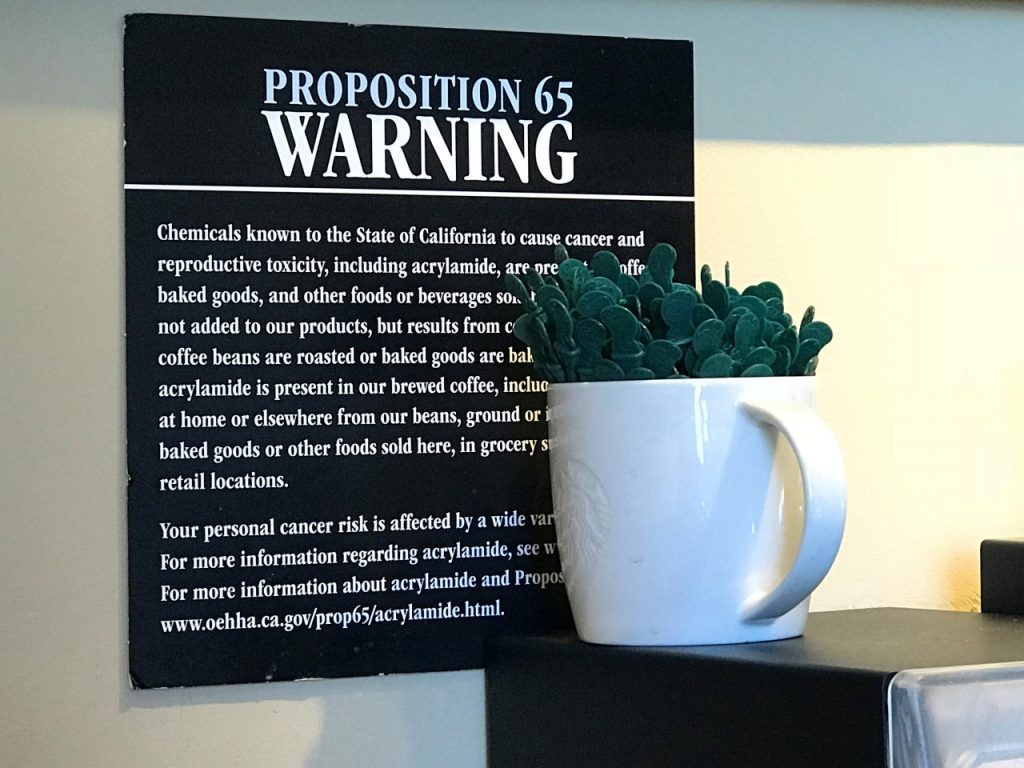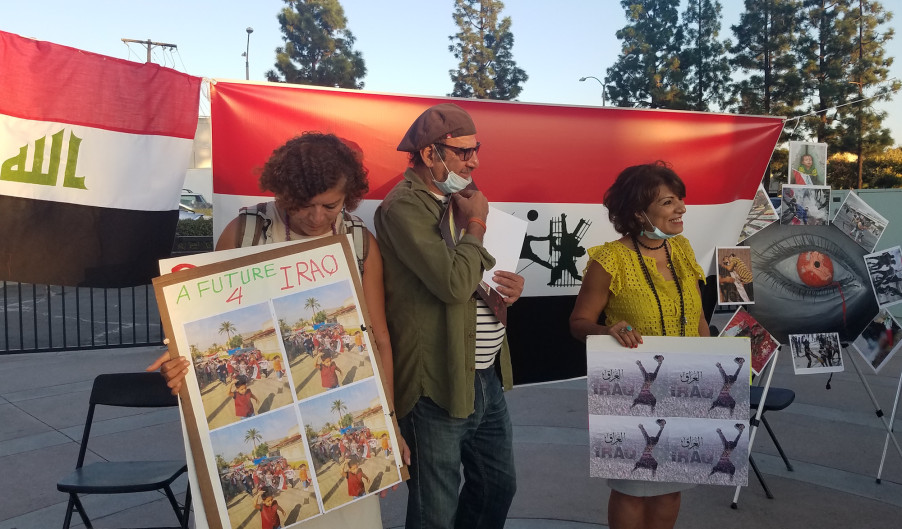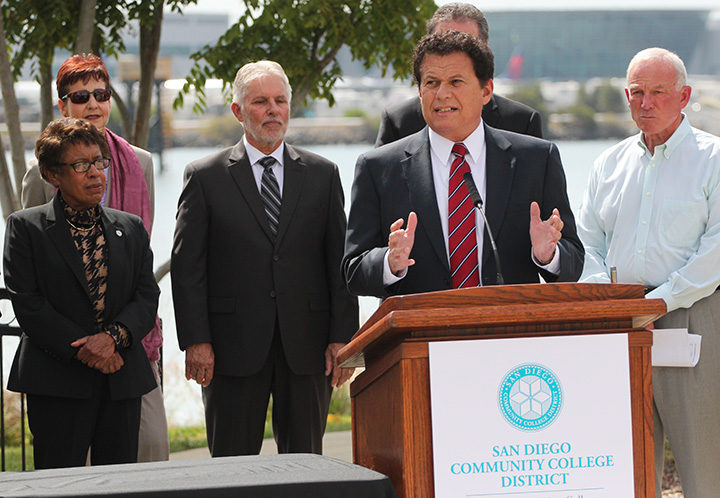Daily Business Report-Dec. 13, 2019
Wedad Schlotte, the vice-president of the San Diego chapter of the American-Arab Anti-Discrimination Committee, helps lead a protest of the anti-Iraqi government over alleged corruption and economic hardships in El Cajon. (Photo by Claire Trageser)
In Summary:
El Cajon’s population is more than 70 percent white, its politics conservative Republican. But it’s changing as it becomes home to one of the nation’s largest populations of Chaldeans, a persecuted religious and ethnic minority from Iraq.
Large Chaldean Iraqi
population thrives in El Cajon
By Claire Trageser | KPBS
Walk down Main Street in El Cajon and you feel like you’re on the set of an old Western. The wide street is lined with old-fashioned storefronts selling antique furniture and used clothes.
On a recent Sunday evening, people were swing dancing to country music at a restaurant called Downtown Cafe. But across the street in a park, there was a different scene: more than 100 people gathered in solidarity with the on-going street protests in Iraq over alleged corruption and economic hardships. They made speeches and sang in Arabic.
Wedad Schlotte is the vice-president of the San Diego chapter of the American-Arab Anti-Discrimination Committee and a leader at the protest. She said the protests demonstrated the dichotomy she inhabits: She moved to the U.S. in the 1980s but still feels a strong connection with Iraq.
“I feel torn between my country, United States, and between my homeland,” she said. “I came to the United States to study and return. But I fell in love with the democracy and the sense of justice and the educational opportunities.”
This dichotomy is something a lot of people feel in El Cajon. The city lies about 10 miles inland from San Diego, and its population is more than 70 percent white, with generally conservative, Republican politics.
But in recent decades, the city has been changing — it’s now home to one of the largest populations in the country of Chaldeans, a persecuted religious and ethnic minority from Iraq. They are part of a larger Middle Eastern community in El Cajon, with refugees and immigrants from Iraq, Syria and Afghanistan.
There are about 15,000 Chaldeans in El Cajon, and the community has made its stamp on the city. Restaurants, clothing stores, jewelry shops and corner markets are owned by Chaldeans, catering to their community. Plus, there are Chaldean schools and churches, even a Chaldean radio station.
Besma Coda, who works for Chaldean Middle Eastern Social Services, a non-profit that helps new arrivals adjust to their new city, said once El Cajon was established as a destination for Chaldeans, that’s where refugees want to come.
“If people first move to Tennessee or somewhere else in the country, when they hear about the community here they would take their stuff after they resettle and they would come to El Cajon,” she said.
But there is still one area where Coda would like to see Chaldeans make more progress.
“Political, we’re not there yet,” she said. “But I’m hoping the new generation, I hope they would be involved with politics and get into higher positions.”
That may happen in the November 2020 election. Mike Aqrawi is one of the area’s top real estate agents, catering specifically to the Chaldean community.
“Seventy percent of my clients are Middle Eastern and Chaldean, and 30% are local residents who are selling their homes to my clients,” he said.
Now he’s running for a seat on the El Cajon City Council, vying to be one of the first to represent the interests of his community. Those interests divide into two groups, he said.
“There are people who migrate, and they are low-income. They live in apartments, and they’re trying to improve their lives; and they have those challenges,” Aqrawi said. “And the other people who are improving their lives, trying to improve El Cajon by opening more businesses.”
The recent arrivals need reduced crime and better services, while people who have been in El Cajon longer need easier permitting processes and better city planning to help open businesses, he said.
So far, no one is challenging Aqrawi for the City Council seat.
After years of enduring religious persecution in Iraq, the community is hoping new political power will move them from the sidelines to become an even more interwoven part of their city.
The California Dream series is a statewide media collaboration of CalMatters, KPBS, KPCC, KQED and Capital Public Radio with support from the Corporation for Public Broadcasting and the James Irvine Foundation.
___________________
U.S.-Mexico-Canada trade deal includes
$300 million to stop Tijuana River pollution
The U.S.-Mexico-Canada Agreement trade deal includes $300 million in funding to address cross-border pollution in the Tijuana River Valley, San Diego’s congressional delegation announced Wednesday. The funding would be dispersed in four annual installments of $75 million in the form of U.S. Environmental Protection Agency grants under its Border Water Infrastructure Program. In June, the fiscal year 2020 federal budget for the BWIP was only $30 million, according to the office of Rep. Scott Peters, D-San Diego.
___________________

Cannabis linked to birth complications
By Judy Lin | CalMatters
Pregnant women should be warned about THC risks in their babies. That decision was handed down Wednesday by a panel of expert scientists meeting in Sacramento.
- The state Developmental and Reproductive Toxicant Identification Committee voted 8-1 to label THC – the high-inducing chemical in marijuana – as developmentally toxic.
- Scientists based their decision on studies that link cannabis to low birth weight, early deliveries, infant mortality or cognitive or health problems with children. The cannabis industry arguedthere hasn’t been enough research. They warned the move could make them targets of lawsuits.
- Aydin Nazmi, professor at Cal Poly San Luis Obispo, was the lone vote against warning labels. He said he didn’t believe there was enough evidence.
Oh, and cannabis smoke is toxic. The same panel of scientists voted unanimously to label cannabis smoke toxic. Dan Morain has previously reported on the rising number of Californians hospitalized due to vaping-related illnesses.
- “There’s no ban on the use of chemicals. It’s a right-to-know law that provides, in some cases, for people to make their own personal decision about what products to use,” said Sam Delson, a spokesman for the California Office of Environmental Health Hazard Assessment.
Expect more warning labels. Under Proposition 65, California requires foods, products and even places to have warning labels with that familiar phrase “known to the State of California to cause cancer, birth defects or other reproductive harm.”
- THC and cannabis smoke immediately go on the Prop. 65 chemicals list. However, there’s a one-year grace period for labeling, and the state could tailor a special warning if it chooses.
- Pot joins alcohol, tobacco, gasoline and even Subway sandwiches.



